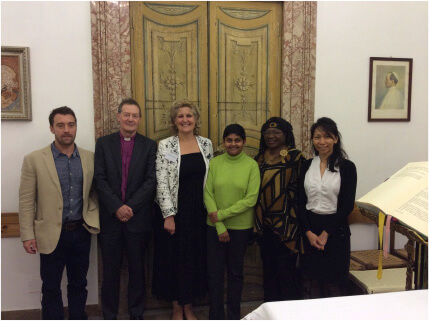You can watch a full recording of the webinar here
The event took place during an Anglican Alliance consultation in Rome, which saw participants from across the Anglican Communion come together with representatives from Caritas Internationalis, the Global Freedom Network, the Salvation Army and others to discuss how churches are already responding to human trafficking and modern slavery and how they can work together for greater impact.
Revd Rachel Carnegie, Co-Executive Director from the Anglican Alliance, chaired the one-hour webinar session, which shared outcomes and recommendations of the consultation with a global audience.
Five presenters joined the webinar and shared their comments on the consultation: Holly Allan, Executive Director of Helpers for Domestic Helpers (HDH) at St John’s Cathedral in Hong Kong; Noah Bullock, Executive Director of Foundation Cristosal; Canon Delene Mark, Director at HOPE Africa; Dr Fulata Moyo, Programme Executive for Women in Church and Society at the World Council of Churches; and The Rt Revd Dr Alastair Redfern, Bishop of Derby in the Church of England.
The conversation covered six key areas that had been discussed throughout the consultation: Policy, Prevention, Protection, Prosecution, Participation, and Partnership.
Bishop Alastair said, “No part of the world is unaffected by modern slavery. The Church exists at local level in every region – we can respond to slavery.”
A key outcome for the consultation was to bring international, interfaith and ecumenical partners together to recommend national and international solutions to work together against modern slavery and human trafficking. A comment from a participant in India, who works at the local level within parishes to respond to slavery, highlighted the need for an effective international network and a collaborative roadmap. It was noted by presenters and participants that capacity needs to be built nationally in response to local contexts, but it is only in working together across borders that we can eradicate modern slavery and human trafficking around the world.
Noah Bullock said, “We need to be better at identifying trafficking in our own contexts. And where legislators are not responding, the church needs to speak out at a societal level.”
Noah talked about local education to enable the identification of those who had been trafficked and create an awareness, which would help in the prosecution process.
Mapping available resources and providing education on protection and prevention was a another recommendation in response to questions around how local churches can act. The panel highlighted the importance of collaborating with organisations already working in this area both locally and globally, to work together and use available resources in a coordinated response.
Faith communities have a unique response to issues of modern slavery and human trafficking. Dr Fulata asked the question, “How can Biblical principles be communicated to victims of modern-day slavery?” The consultation members will work together to produce a resource of Contextual Bible Studies to enable local churches and other faith groups to engage with the issues through deepening understanding, prayer and action.
A comment from a member of the audience shared a seventh ‘P’ in response to the key issues being discussed, noting Prayer as a central part of the Church’s response to trafficking.
Bishop Alastair said, “Without a discipline of reflection we are unable to do our work. Our desire for justice must be open to God.”
Delegates at the consultation in Rome also spent a day in prayer and reflection in Assisi, considering the ministry of St Francis to the most vulnerable and oppressed of his time, and deepening the spiritual foundations of the week’s work.
Presentation slides can be viewed here.
A report on the consultation will be available on the Anglican Alliance website by early December.
In the picture, from left to right: Noah Bullock, Rt Revd Alastair Redfern, Revd Rachel Carnegie, Canon Delene Mark, Dr Fulata Mayo and Holly Allan all took part as presenters on the webinar panel and are delegates at the international consultation on modern slavery and human trafficking in Rome, November 2014.

